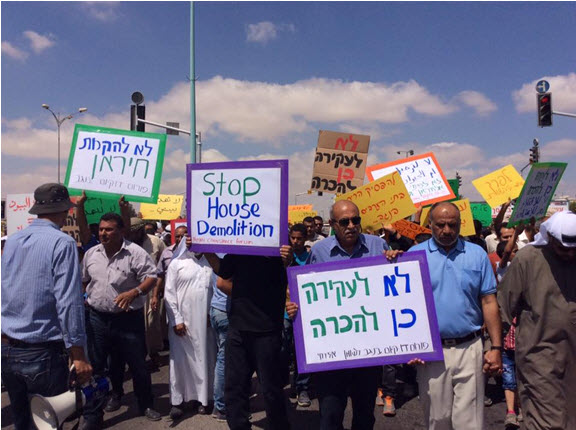The impending demolition of an unrecognized Bedouin village and its replacement with a Jewish town is spurring lawmakers, activists, and residents of the area under threat to attempt heading off the plan. On Wednesday, June 10, Amnesty International demanded that Israel cancel the demolition orders against the communities of Atir and Umm al-Hiran in the Negev and officially recognize all unrecognized Arab-Bedouin villages. The organization claimed that house demolitions repudiate the International Covenant on Economic, Social and Cultural Rights to which Israel is a signatory.

Demonstrators protest the looming demolition of Atir and Umm al-Hiran in Beer-Sheva, June 10. (Photo: Co-existence Forum)
Joint List members of Knesset, Arab-Bedouin Negev residents and civil society representatives met in the Knesset on Tuesday, June 9, to discuss strategy in opposing a recent Supreme Court decision which effectively gives the green light to the demolitions. On May 5, the court dismissed an appeal by residents of Atir and Umm al-Hiran – Bedouin communities with a total population of 1,400 situated northeast of Beersheba – against the State’s decision to demolish the villages and replace them with a new Jewish town named Hiran.
At the start of Tuesday’s meeting, MK Ayman Odeh (Hadash), head of the Joint List, said with regarding to the looming threat to Atir and Umm al-Hiran: “Since [the case of] Majdal-Askalan in 1953, the state has never demolished an entire [Arab] village,” referring to a Palestinian Arab village that, until then, stood where the Israeli city of Ashkelon is now situated. Odeh maintained that the demolition of Atir and Umm al-Hiran “would be an historic turning point,” and argued that the main focus of opposition to the Supreme Court’s decision, Odeh should be on the street rather than in the Knesset. “We should rely mostly on a popular struggle,” he said, calling for protests and demonstrations.
The history of Umm al-Hiran goes back to the early 1950s, when the Israeli military governor twice relocated the Qawa’in Bedouin tribe eastward, allowing them to settle in the Yatir Forest just south of the West Bank. While Israel’s government formally approved the establishment of Umm al-Hiran in 1956, in fact it never recognized the settlement in its official records. Since approving the founding the Jewish town of Hiran in 2002, authorities have tried to relocate the residents of Umm al-Hiran to the nearby Bedouin village of Hura.
For the last several years now, Israel has consistently attempted to implement a policy of moving Bedouin off so-called “state lands” into recognized villages, but has been met by fierce opposition, including violent protests which broke out over a year ago against the Prawer plan, which was subsequently shelved.
Some participants at Tuesday’s meeting said that “internationalizing” the issue should be the key strategy in fighting the impending demolition of Umm al-Hiran. Towards this end, MKs from the Joint List volunteered to contact Western embassies and lobby for Umm al-Hiran, using English fact sheets prepared by the Regional Council for the Unrecognized Villages in the Negev, an Israeli NGO which represents the 36 unrecognized Bedouin communities.
MK Aida Touma-Sliman (Hadash), the newly-appointed head of the Committee on the Status of Women and Gender Equality, claimed that “the establishment has always tried to negotiate with leaders who don’t represent the population.” Touma-Sliman said that “We must create an atmosphere in which every time [a community leader] plans collaborating [with the establishment], he will think twice.” Touma-Sliman suggested busing in residents of Umm al-Hiran to personally meet with Knesset members. “A person whose home is about to be demolished is the best lobbyist,” she argued. “Let’s bring half of Umm al-Hiran to the Knesset.”
MK Dov Khenin, (Hadash) said that the best way to fight the demolition of Umm al-Hiran was by educating the Israeli public about the issue. “I bet that 90% of people in Tel Aviv, as well as here in the Knesset, don’t even know what we’re talking about,” he said.
Related:


